ISSN: 2782-5914 (Print)
ISSN: 2782-5906 (Online)

Abdirayymova, G. S. (2015), “Social well-being of youth: searching for problem areas”, The Journal of Psychology & Sociology, vol. 54, no. 3, pp. 92–98, available at: http://bulletin-psysoc.kaznu. kz/index.php/1-psy/article/view/161 (accessed 06 August 2017) (in Russian).
Antonova, N. L. (2015), “Health-saving practices of the younger generation”, in Korableva, G. B. and Merenkov, A. V. (eds), Sotsialnoye prostranstvo sovremennogo goroda [Social space of the modern city], Izdatel’stvo Ural’skogo universiteta, Yekaterinburg, pp. 78–100 (in Russian).
Arsent’ev, E. A. (2005), “Youth organizations of modern Russia”, Prepodavanie istorii v shkole, no. 7, pp. 16–24 (in Russian).
Brewis, G., Russel, J. and Holdsworth, К. (2010), Bursting the Bubble: Students, Volunteering and the Community. Research Summary, The Institute for Volunteering Research, 13 p., available at: https://www.publicengagement.ac.uk/sites/default/files/NCCPE%20-%20Bursting%20the%20 bubble.pdf (accessed 06 August 2021).
Donahue, K. and Russell, J. (2009), Provide Volunteer Impact Assessment. Final Report, The Institute for Volunteering Research, available at: http://www.ivr.org.uk/evidence-bank/evidence-pages/PR OVIDE+Volunteer+Impact+Assessment (accessed 08 September 2021).
Gaskin, K. (2009), Young people volunteering and civic service: A review of literature, The Institute for Volunteering Research, available at: http://www.ivr.org.uk/component/ivr/young-peoplevolunteeringand-civic-service-a-review-of-literature (accessed 06 October 2021).
Gorshkov, M. K. and Sheregi, F. E. (2014), “On the life plans of Russian youth: present and future”, in Gorshkov, M. K., Li Chunlin, Golenkova, Z. T. and Kozyreva, P. M. (eds), Rossiya i Kitai: molodezh’ XXI veka [Russia and China: youth of the XXI century], Novyi khronograf, Moscow, pp. 384–404 (in Russian).
Grunt, E. V. and Zaiko, A. P. (2016), “Typological analyses of college students’ social activities in the transforming society”, Discussion, no. 1 (64), pp. 86–92 (in Russian).
Holdsworth, C. (2010), Student Volunteers: A national profile, The Institute for Volunteering Research, available at: http://www.hecsu.ac.uk/assets/assets/documents/futuretrack/Student_Volunteers_- _A_National_Profile.pdf (accessed 06 October 2021).
Hustinx, L. (2001), “Individualization and new styles of youth volunteering: an empirical exploration”, Voluntary Action, vol. 3, no. 2, pp. 57–76.
Hutin, M. (2012), Young people help out: volunteering and giving among young people, The Institute for Volunteering Research, available at: http://www.ivr.org.uk/evidencebank/evidence-pages/ Young+people+help+out (accessed 06 October 2021).
Kokusheva, A. A. (2015), “The absenteeism mood among young people: the causes of political alienation”, The Journal of Psychology & Sociology, vol. 52, no. 1, available at: http://bulletin-psysoc.kaznu. kz/index.php/1-psy/article/view/183 (accessed 06 August 2017) (in Russian).
Lauberts, K. Yu. and Kelbetova, E. S. (2017), “The development of public associations in Kazakhstan and their current state”, in Gabdualieva, R. S. (ed.), Povyshenie konkurentosposobnosti natsional’noi ekonomiki v ramkakh EAES, materialy Mezhdunarodnoi nauchno-prakticheskoi konferentsii, 17 marta 2017, Ural’sk, v 3 chastyakh. Chast’ 3 [Enhancing the Competitiveness of National Economy with in EAEU, materials of the International conference, Uralsk, Kazakhstan, March 17, 2017, in 3 parts, Part 3], West Kazakhstan Innovation and Technology University, Uralsk, pp. 233–238 (in Russian).
Lebedev, P. (2008), “ ‘It’s more fun when together’, or ‘No man is an island’ ”, Sotsial’naya real’nost’, no. 5, pp. 41–69, no. 6, pp. 64–71 (in Russian).
Muxel, A. (2001), L’expérience politique des jeunes, Presses de Sciences Po, Paris, 189 p.
Shaukenova, Z. K. (ed.) (2014), Sotsial’naya aktivnost’ molodezhi Kazakhstana v sovremennykh sotsial’no-politicheskikh realiyakh [Social activity of the youth of Kazakhstan in modern sociopolitical realities], Institute of Philosophy, Political Science and Religious Studies of the Science Committee of the Ministry of Education and Science of the Republic of Kazakhstan, Almaty, 168 p. (in Russian).
Trofimova, I. N. (2017), “Political Orientations of Today’s Youth in Russia”, in Gorshkov, M. K. (ed.), Rossiya reformiruyushchayasya, ezhegodnik. Vypusk 15 [Russia in reform, a yearbook. Iss. 15], Novyi khronograf, Moscow, pp. 304–324 (in Russian).
Vishnevskii, Yu. R., Didkovskaya, Ya. V. and Pevnaya, M. V. (eds) (2011), Problemy professional’nogo samoopredeleniya molodezhi: analiz tsennostnykh orientatsii i professional’nykh strategii, informatsionno-analiticheskii otchet po materialam sotsiologicheskogo issledovaniya (2010–2011) [Problems of professional self-determination of young people: analysis of value orientations and professional strategies, information and analytical report based on the materials of a sociological study (2010–2011)], Ural Federal University, Yekaterinburg, 168 p. (in Russian).
Zhusipkalieva, Sh. S. (2014), “Status and development prospects of the youth social movement in the Republic of Kazakhstan”, in Shaukenova, Z. K., Seidumanov, S. T., Abdiraiymova, G. S., Dzhamanbalaeva, Sh. E., Abdikerova, G. O., Shedenova, N. U. et al. (eds), Materialy ІІ Foruma molodykh sotsiologov Kazakhstana (v ramkakh V Kongressa sotsiologov Kazakhstana «Strategiya «Kazakhstan-2050: sotsial’noe razvitie obshchestva» i VKongressa sotsiologov tyurkoyazychnykh stran «Natsional’nye strategii razvitiya tyurkoyazychnykh stran») [Materials of the II Forum of Young Sociologists of Kazakhstan (within the framework of the V Congress of Sociologists of Kazakhstan “Strategy “Kazakhstan-2050: Social Development of Society” and the V Congress of Sociologists ofTurkic-Speaking Countries “National Development Strategies ofTurkic-Speaking Countries”)], Almaty, pp. 453–459 (in Russian).
Zubok, Yu. A. (2015), “Molodezh’ v izmenyayushcheisya sotsial’noi real’nosti: problema samoregulyatsii vybora”, in Kiseleva, M. S. (ed.), Chelovek pered vyborom v sovremennom mire: problemy, vozmozhnosti, resheniya, materialy Vserossiiskoi nauchnoi konferentsii, 27–28 oktyabrya 2015, IF RAN, Moskva, v 3 tomakh. Tom 2 [Man facing a choice in the modern world: problems, opportunities, solutions, Proceedings of the All-Russian Scientific Conference, Moscow, IP RAS, October 27–28, 2015, in 3 vols, Vol. 2], Nauchnaya mysl, Moscow, pp. 173–189 (in Russian).
Zubok, Yu. A. and Chuprov, V. I. (2011), Sotsiologiya molodezhi [Sociology of youth, textbook], Norma, INFRA-M, Moscow, 335 p. (in Russian).